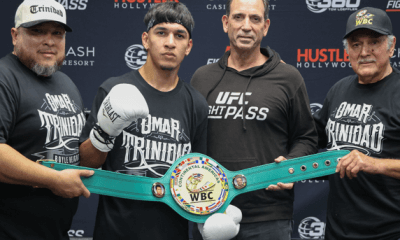Featured Articles
A Conversation with Esteemed Boxing Writer Tris Dixon, Author of “Damage……”

Through the passage of a quarter century, Tris Dixon has been at various times an amateur boxer, trainer, editor and writer.
And for all this, it’s Dixon’s most-recent book, “Damage: The Untold Story of Brain Trauma in Boxing” (available at all fine bookstores and Amazon), that he has delivered his most-telling blow.
“I felt like there was always a focus on short-term damage sustained in boxing, and plenty of awareness about what might happen to a boxer on fight night and those worst-case scenarios we all dread,” said the 42-year-old Dixon, who is based in England and has penned work for Boxing Digest, Boxing Scene, The Ring Magazine and RingTV.com. “However, not only was little known about CTE (chronic traumatic encephalopathy) in boxing and its timeline links to punch drunk syndrome and there was little understanding about what might happen to a boxer down the line and how they might be healthy when they retire, only to struggle with neurological issues later in life.”
Dixon, a former editor at Boxing News, continued: “And, as well as all the usual cognitive symptoms like speech, tremors and so forth, it seemed like there was a real lack of awareness about brain trauma altering decisions people make, how it can lead to depressions, impulsivity, mood swings and other behavioral issues that simply aren’t often discussed.” he said.
What would Dixon like the book to accomplish?
“I hope it makes an uncomfortable subject something people are more open to discuss. Punch drunk has for so long been a negative term, used insultingly, and the warriors of our sport deserve more for everything they’ve put on the line,” he said. “I hope that long-term damage is no longer a taboo subject and I also hope the book raises awareness about what can happen to fighters after the final bell and allows them and those charged with looking after them to make more informed decisions about their futures.”
Every boxer who steps into the ring ought to be keenly aware of the ramifications of being hit repeatedly in the head.
Over the years there have been calls to abolish the sport. What does Dixon, who carved out a 13-7 ring record between the ages of 16 and 26, feel about this?
“I think it’s ridiculous. It’s such a big leap from having the sport and then just banning it when so much can be done to mitigate the risks fighters face, whether it’s reducing sparring and exposure to head trauma or commissions and governing bodies working together to share medical information to keep fighters safe,” he offered. “The fights are the fights, but even then, improvements can be made to the personnel assigned to look after the fighters more often than not.”
Dixon, a journalist with 16,000 Twitter followers, wants to be even-handed when it comes to covering boxing. As such, what does he see his role being?
“I’ve done long investigative pieces, I’ve written books, ghost-written autobiographies, covered thousands of fights from ringside, interviewed hundreds and hundreds of fighters and written thousands of opinion pieces,” he stated. “The job, to me, is to remain impartial and provide either my viewpoints or those of the people I interview in a fair and balanced manner.”
Dixon said that having been involved in so many aspects of the fight game has served him well as a writer.
“All experience in boxing has helped. I’ve also cleaned gyms, carried spit buckets, wrapped hands and been a round card guy at a women’s fight,” he said. “Ultimately, what helps with writing the most is practice, experience and a good amount of reading.”
What catapulted Dixon to fall in love with the manly sport? “I’d followed boxing as a kid and was inspired by the (Chris) Eubank, (Nigel) Benn, (Michael) Watson and (Steve) Collins era of the super-middleweights, but I’d never even thought about boxing,” he recalled. “It was only when a guy I played rugby with suggested we started boxing training to boost our pre-season fitness that I started going to my first amateur boxing club, Salisbury City ABC.”
Dixon said while he had a decent amateur record, he didn’t feel it would be wise to continue which led to his transition to becoming a writer.
“No way was I that good. I imagine if I made the jump to writing it would have been that much harder, but I was never very good,” he said.
The United Kingdom has always had an affinity for the gloved sport, but it’s especially true during the last three decades.
“It helps that we’ve had a huge heavyweight presence from Frank Bruno to Lennox Lewis to Tyson Fury to David Haye and Anthony Joshua for the best part of the last 30 years,” Dixon pointed out. “Then, after Audley Harrison won the gold medal at the Sydney Olympics in 2000, more money ploughed into our amateur system which has allowed us to have stellar Olympic teams from 2008 onwards. Plus, we’ve had some iconic fighters, with (Joe) Calzaghe, (Ricky) Hatton, (Amir) Khan, (Tony) Bellew, (Kell) Brook and (Carl) Froch and we’ve had the flag-bearers who have attracted a lot of press throughout their careers.”
Unlike the National Football League, National Basketball Association, Major League Baseball and the National Hockey League, boxing doesn’t have a commissioner overseeing its sport. If Dixon was made boxing’s commissioner, what would he do to make the sport safer?
“One of the things suggested by a top neurologist in the book is a centralized database of brain scans that can be used worldwide by governing bodies to keep boxers safe,” he said. “They can track changes over time and it means if a fighter can’t get licensed somewhere because he is no longer fit to fight, he can’t stumble through any of boxing’s many loopholes to fight somewhere else, running the risk of sustaining more damage – acute or chronic – that could be life-changing.”
Boxing is a beautiful and artistic sport with a long and illustrious history that can literally change a person’s life for the good or sometimes the bad.
For every Sugar Ray Leonard, who fought his way to glory, earned multi-millions of dollars and left the ring with all of his faculties intact, there is a Bobby Chacon, a champion who left this earth at age 64 due to dementia which was linked to brain injuries caused by being involved in too many slugfests.
Here’s hoping Dixon’s book is a clarion call to everyone involved in the sport which translates into more boxers ending up like Leonard and not like Chacon.
Check out more boxing news on video at the Boxing Channel
To comment on this story in the Fight Forum CLICK HERE
-

 Featured Articles3 weeks ago
Featured Articles3 weeks agoThe Hauser Report: Zayas-Garcia, Pacquiao, Usyk, and the NYSAC
-

 Featured Articles2 weeks ago
Featured Articles2 weeks agoOscar Duarte and Regis Prograis Prevail on an Action-Packed Fight Card in Chicago
-

 Featured Articles1 week ago
Featured Articles1 week agoThe Hauser Report: Cinematic and Literary Notes
-

 Book Review4 days ago
Book Review4 days agoMark Kriegel’s New Book About Mike Tyson is a Must-Read
-

 Featured Articles4 weeks ago
Featured Articles4 weeks agoManny Pacquiao and Mario Barrios Fight to a Draw; Fundora stops Tim Tszyu
-

 Featured Articles4 weeks ago
Featured Articles4 weeks agoArne’s Almanac: Pacquiao-Barrios Redux
-

 Featured Articles3 weeks ago
Featured Articles3 weeks agoRemembering Dwight Muhammad Qawi (1953-2025) and his Triumphant Return to Prison
-

 Featured Articles4 weeks ago
Featured Articles4 weeks agoOleksandr Usyk Continues to Amaze; KOs Daniel Dubois in 5 One-Sided Rounds


















